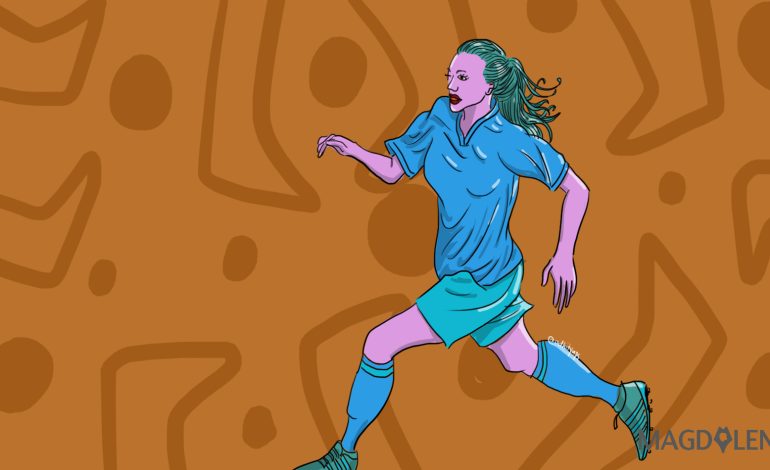Underpaid and Legally Unprotected: The Plight of Women’s Footballer

The International Federation of Professional Footballers (FIFPRO) has called on the FIFA (international governing body of football) as well as confederations and national federations to improve the working condition of female football players across the globe.
Women are still falling behind in football when it comes to gender equality. This issue has been exposed in a survey conducted by FIFPRO on working conditions in women’s. Participated by 3,600 female football players and published in December last year, the survey revealed the various types of issues faced by most female footballers.
Among the top findings were denial of players’ professional status; players leaving the game early; low pay, late pay and even no pay for them; lack of contracts, discrimination and harassment; lack of support for players who want children; match fixing; and players having dual careers.
FIFPRO revealed that 44 percent of the respondents considered themselves amateurs and only 24 professionals. The remaining 32 percent described themselves as semi-professionals, although the category “semi-professional” itself doesn’t exist in FIFA Regulations.
Female players who earn very low income but have written contracts are still considered “professional” according to the FIFA Regulations on the Status and Transfer. Even so, in many places, most of them are treated as amateur players, as they are not entitled to proper benefits and protections.

The survey actually found only 18 percent of the players could be categorized as professional according to the FIFA Regulations. Article 2.2 of the Regulations on the Status and Transfer states that “a professional is a player who has a written contract with a club and is paid more for his footballing activity than the expenses he effectively incurs.”
Nearly half of the respondents are not paid by their club and about 42 percent of the players stated they don’t receive any money to play football.
A British footballer interviewed by FIFPRO for this survey described her poor treatment: “I train four to five days per week for no salary, and my travel expenses are not covered. I have a part-time job to make ends meet.”
In Indonesia the absence of contracts leave many female football players at a disadvantage.
“There was a player who was playing for a club in Jakarta and West Java. Then she was recruited by a club in Banten. This club only told her to say good-bye to her previous club before joining them,” sports activist Amanda Kuswandi said, citing an example of the informal transfer of female players due to the lack of contract.
Having a written contract is basic need of employment. It provides a proof of what was agreed between the players and the club. Only 53 percent of the female players surveyed by FIFPRO reported having a copy of their contract with their club. This percentage is extremely lower than that of men at 92 percent, according to FIFPro’s 2016 report.
Amanda added that there was a case of a U-15 female player who had to bear the cost of treatment of her hamstring injury. In contrast, the Indonesian football federation paid the medical treatment of her male counterpart (a U-16 male player), who had the same injury.
And even if players have written contracts, it doesn’t guarantee job security, especially if the contract is only for short term. Based on the survey, the duration of an employment contract was immensely shorter than that of men. The average length of contract term of female players is 12 months.
Said Joanna Lohman, an American professional football player who plays for the Washington Spirit, a club in US Women’s Football League: “To play (football) when you’re 35 years old is already very rare because many players have stopped playing by this age.”
“We don’t get paid much. Our contracts are very short, usually for one year or a maximum of two years. The men’s contracts are completely different. There should be certain aspect of the men’s and women’s contract that should be equitable,” she told Magdalene after “Super-Sports Women,” an event held by US Embassy and Women’s Footie Indonesia in early January at @America.
Juggling and Sexual Harrasment
Many female players juggle between study or work and football. About 45 percent of the players are students and around 23 percent of the respondents of the survey are under 18.
On May 8-20, 2017, the Asian Football Federation (AFF) U-15 Girls‘ Championship was held in Vientiane, Laos. Before the tournament, the players took part in the Indonesian national training camp in Lubuk Linggau, South Sumatera, coinciding with the national exam schedule. While the male players took the exam in a school together, their females counterpart were sent back to their respective schools to take the exam.
Amanda criticized the different treatment between male and female player: “At that time, there are four girls who needed to take the exam. Instead of sending them to their respective schools, why didn’t the federation and national exam committee organized the examination in Lubuk Linggau?”
“They trained only in the afternoon and still had time to sit for the national exam afterwards. As a consequence, after returning from Laos, the girls had to take make-up exams,” she added.
The survey also revealed that 3.5 percent of the respondents or 116 women reported sexual harassment, and 46 of them were harassed by their coaching staff.
Hope Solo, USA women’s football team goalkeeper, said that sexual harassment in sport is rampant.
“In the past, female players dated and ended up marrying their college coaches, something that a coach should obviously not be doing, especially with a young player,” she said in Web Summit event in Lisbon last November.
“I’ve seen it not just with coaches. I’ve seen it with trainers, doctors and our press officers. I’ve seen it amongst players in the locker room. It’s rampant.”
She also confessed that Sepp Blatter (the former head of FIFA), sexually harassed her at a FIFA awards ceremony in January 2013.
“Sepp Blatter grabbed my ass, it was a few years ago at the Ballon d’Or ceremony just before I got on stage”, she added.
Read Wulan’s piece on gender-based segregation in public transport.






















